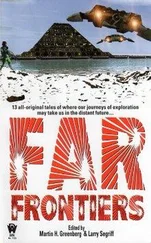Both these natural biological methods occurred in one or other of the plant-animal worlds that reached the "human" level. I have space only to describe a single example, the most significant of these remarkable worlds. This was one in which all free atmosphere had been lost long before the appearance of intelligence.
To enter this world and experience it through the alien senses and alien temperament of its natives was an adventure in some ways more bewildering than any of our earlier explorations. Owing to the complete absence of atmosphere, the sky, even in full sunlight, was black with the blackness of interstellar space; and the stars blazed. Owing to the weakness of gravitation and the absence of the molding action of air and water and frost on the planet's shrinking and wrinkled surface, the landscape was a mass of fold-mountains, primeval and extinct volcanoes, congealed floods and humps of lava, and craters left by the impact of giant meteors. None of these features had ever been much smoothed by atmospheric and glacial influences. Further, the ever-changing stresses of the planet's crust had shattered many of the mountains into the fantastic forms of ice-bergs. On our own earth, where gravity, that tireless hound, pulls down its quarry with so much greater strength, these slender, top-heavy crags and pinnacles could never have stood. Owing to the absence of atmosphere the exposed surfaces of the rock were blindingly illuminated; the crevasses and all the shadows were black as night.
Many of the valleys had been turned into reservoirs, seemingly of milk; for the surfaces of these lakes were covered with a deep layer of a white glutinous substance, to prevent loss by evaporation. Round about clustered the roots of the strange people of this world, like tree-stumps where a forest has been felled and cleared. Each stump was sealed with the white glue. Every stretch of soil was in use; and we learned that, though some of this soil was the natural result of past ages of action by air and water, most was artificial. It had been manufactured by great mining and pulverizing processes. In primitive times, and indeed throughout all "pre-human" evolution, the competitive struggle for a share of the rare soil of this world of rock had been one of the main spurs to intelligence.
The mobile plant-men themselves were to be seen by day clustered in the valleys, their foliage spread to the sun. Only by night did we observe them in action, moving over the bare rock or busy with machines and other artificial objects, instruments of their civilization. There were no buildings, no roofed weatherproof enclosures; for there was no weather. But the plateaux and terraces of the rock were crowded with all manner of artifacts unintelligible to us.
The typical plant-man was an erect organism, like ourselves. On his head he bore a vast crest of green plumes, which could be either folded together in the form of a huge, tight, cos lettuce, or spread out to catch the light. Three many-faceted eyes looked out from under the crest. Beneath these were three arm-like manipulatory limbs, green and serpentine, branching at their extremities. The slender trunk, pliable, encased in hard rings which slid into one another as the body bowed, was divided into three legs for locomotion. Two of the three feet were also mouths, which could either draw sap from the root or devour foreign matter. The third was an organ of excretion. The precious excrement was never wasted, but passed through a special junction between the third foot and the root. The feet contained taste-organs, and also ears. Since there was no air, sound was not propagated above ground.
By day the life of these strange beings was mainly vegetable, by night animal. Every morning, after the long and frigid night, the whole population swarmed to its rooty dormitories. Each individual sought out his own root, fixed himself to it, and stood throughout the torrid day, with leaves outspread. Till sunset he slept, not in a dreamless sleep, but in a sort of trance, the meditative and mystical quality of which was to prove in future ages a well of peace for many worlds. While he slept, the currents of sap hastened up and down his trunk, carrying chemicals between roots and leaves, flooding him with a concentrated supply of oxygen, removing the products of past katabolism. When the sun had disappeared once more behind the crags, displaying for a moment a wisp of fiery prominences, he would wake, fold up his leaves, close the passages to his roots, detach himself, and go about the business of civilized life. Night in this world was brighter than moonlight with us, for the stars were unobscured, and several great clusters hung in the night sky. Artificial light, however, was used for delicate operations. Its chief disadvantage was that it tended to send the worker to sleep.
I must not try even to sketch the rich and alien social life of these beings. I will only say that here as elsewhere we found all the cultural themes known on earth, but that in this world of mobile plants all was transposed into a strange key, a perplexing mode. Here as elsewhere we found a population of individuals deeply concerned with the task of keeping themselves and their society in being. Here we found self-regard, hate, love, the passions of the mob, intellectual curiosity, and so on. And here, as in all the other worlds that we had thus far visited, we found a race in the throes of the great spiritual crisis which was the crisis familiar to us in our own worlds, and formed the channel by which we had telepathic access to other worlds. But here the crisis had assumed a style different from any that we had yet encountered. We had, in fact, begun to extend our powers of imaginative exploration.
Leaving all else unnoticed, I must try to describe this crisis, for it is significant for the understanding of matters which reached far beyond this little world.
We did not begin to have insight into the drama of this race till we had learned to appreciate the mental aspect of its dual, animal-vegetable nature. Briefly, the mentality of the plant-men in every age was an expression of the varying tension between the two sides of their nature, between the active, assertive, objectively inquisitive, and morally positive animal nature and the passive, subjectively contemplative, and devoutly acquiescent vegetable nature. It was of course through animal prowess and practical human intelligence that the species had long ago come to dominate its world. But at all times this practical will had been tempered and enriched by a kind of experience which among men is very rare. Every day, throughout the ages, these beings had surrendered their feverish animal nature not merely to unconscious or dream-racked sleep, such as animals know, but to the special kind of awareness which (we learned) belongs to plants. Spreading their leaves, they had absorbed directly the essential elixir of life which animals receive only at second hand in the mangled flesh of their prey. Thus they seemingly maintained immediate physical contact with the source of all cosmical being. And this state, though physical, was also in some sense spiritual. It had a far-reaching effect on all their conduct. If theological language were acceptable, it might well be called a spiritual contact with God. During the busy night-time they went about their affairs as insulated individuals, having no present immediate experience of their underlying unity; but normally they were always preserved from the worst excesses of individualism by memory of their day-time life.
It took us long to understand that their peculiar day-time state did not consist simply in being united as a group mind, whether of tribe or race. Theirs was not the condition of the avian units in the bird-cloud, nor yet of the telepathically constituted world-minds which, as we were later to discover, had a very great part to play in galactic history. The plant-man did not in his daytime life come into possession of the precepts and thoughts of his fellow plant-men, and thereby waken into a more comprehensive and discriminate awareness of the environment and of the multiple body of the race. On the contrary, he became completely unresponsive to all objective conditions save the flood of sunlight drenching his spread leaves. And this experience afforded him an enduring ecstasy whose quality was almost sexual, an ecstasy in which subject and object seemed to become identical, an ecstasy of subjective union with the obscure source of all finite being. In this state the plant-man could meditate upon his active, night-time life, and could become aware, far more clearly than by night, of the intricacies of his own motives. In this day-time mode he passed no moral judgments on himself or others. He mentally reviewed every kind of human conduct with detached contemplative joy, as a factor in the universe. But when night came again, bringing the active nocturnal mood, the calm, day-time insight into himself and others was lit with a fire of moral praise and censure.
Читать дальше









![Олаф Стэплдон - Создатель звезд [сборник litres]](/books/433148/olaf-stepldon-sozdatel-zvezd-sbornik-litres-thumb.webp)


